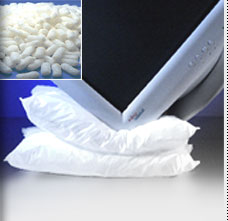 |
| |
Home
:: Biodegradable Plastics |

The new generation plastics fully degradable from symphony
environmentals offers considerable advantages such as increased
landfill capacities by 20-30% and can be engineered to degrade
in as little as 60 days or over 5 years to suit end required
application.
The process of degradation is through the breakdown of carbon-carbon
bonds in the polyethylene reducing the molecular weight down
to the level of 4000 from a quarter million, at which point
the material can be digested by microorganisms in the soil
and water. The DCP additive is neither water soluble nor toxic
and hence safe for disposal in landfill sites.
The materials is also degradable under other conditions viz.
photo and thermal degradation. The bags degrades to mulch
in just 55 days.
The new polyethylene promises extensive applications that
include small produce bags, carrier bags, industrial products
packaging and even degradable plastic aprons. Refuse sacks
are already in the market.

Biodegradable Polyester Amide
BAK, a semi-crystalline largely transparent thermoplastic
developed by Bayers is a new biodegradable polyester amide
plastic claimed to be 100 percent biodegradable and recyclable
with excellent properties including high tensile produced
without solvents, chlorine or any aromatic ingredients, adds
to its green credentials. The biodegradability is achieved
as it breaks down into carbondioxide, water, biomass under
composting conditions. The rate of degradation is similar
to other organic materials and properties similar to typical
polyolefins. The new developed material also seem to be amenable
to various process conversions that include extrusion, blow,
thermoforming, colouring, printing etc., Applications are
extensive including agrihorticulture and food etc.,
Recycling regulations have spurned ecologically safe consumer
friendly bioplastics. The leading chemical industry in Germany,
BASF is testing food bags and packaging from its ecoflex bioplastic
which contains a biodegradable petrochemical polymer.
The latest development of bioplastic in Australia lends itself
to biodegrade at temperatures as low as 0.5 degrees Celsius
or mere exposure to moisture and micro organism in the soil.
The technology appears to be unique as ascertained by Biodegradable
Institute in New York.
Plastics has patented its development of the polymeric looking
material - that looks, feels and is flexible like any conventional
plastic. The process uses standard industrial extruders to
produce cornstarch based pallets and can be converted by blowing
and moulding. The prices are comparable to petroleum based
plastics. However, the drawback of inadequate product preservation
under adverse conditions need to be overcome. This could add
to the cost and thus the costs should come down for plastic
to expand and reach out wider markets. The market trials by
leading multinational food companies should provide the lead
for further developments.
«
Prev
|

